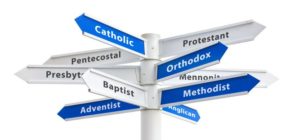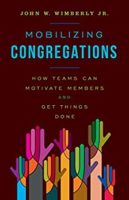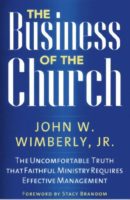
At last week’s General Assembly of the Presbyterian Church (USA), conversations often turned to the question: “Is the end near for our denomination?” Each year the number of affirmative answers seems to increase. I don’t agree. I don’t think mainline denominations are in danger of dying any time soon.
In fact, I see lots of signs that they are finally understanding what faithful ministry must and will be in the 21st century. Yes, when you compile the annual statistics of all the congregations in each denomination, many years there is an overall loss in membership. But the aggregate is not always descriptive of what is happening in the parts. In the recent past, the aggregate numbers of industrial giants AT&T and IBM looked bad. But within the companies, strategic changes were being made that put them back on highly productive and profitable paths.
The Future of Denominations
When I think about the future of denominations, I don’t focus on the national or regional judicatories of the church, important as they are. I pay attention to what’s happening in congregations. Lots of revitalizing, exciting mainline congregations—rural, urban and suburban—are creating a bright future for their denominations. They are why I am bullish about the future of denominations.
Many congregations are making strategic changes now that will produce great results over the next twenty years. Our time is like a farmer’s planting season. A field when it is being planted is not pretty. But if you check back in about four months, things start to look beautiful.
One congregation I have worked over the past year identified five strategic issues: Communications, Facilities, Growth, Outreach, Staffing. Those five areas match what many congregations are focusing on as they plan. I would add Stewardship to the list since the way people give today has changed. It isn’t changing. It has changed.
To me, communications belongs at the top of the list for congregations that want to be effective and productive in the 21st century. Ultimately, religion is about communication. We communicate our faith to our members, our children, and the world. If we are effective communicators, we usually grow both in numbers and effectiveness in mission.
It is no coincidence that the Reformation and the creation of the printing press appeared at about the same time. The printing press gave the Reformers a powerful new tool to communicate their understanding of what the church should be. Today, the internet gives us a communication opportunity that is exponentially more powerful. Many congregations are just beginning to understand the crucial importance of an excellent website, weekly e-communications, live-streaming of worship and so many other forms of communication. As they do, they will become more visible in their communities, be more effective in mission projects, and more attractive to new members. I dare to say, a new Reformation is now taking place in congregations large and small.
Judicatories Lost in Space
What casts a shadow over the fascinating, exciting things happening in congregations is the isolation of too many upper judicatories in the mainline denominations. Too many of them live in a parallel universe to that of the congregations they are called to serve. They have become more focused on survival than rebooting for the 21st century.
But let’s not allow the dysfunction in denominational governance systems distract us from the renewal taking place in congregations. Indeed, the best judicatories are re-orienting themselves to empower and support congregations in response to what congregations say they need. These judicatories are listening and responding—always a key to successful ministry.
When I entered seminary in 1972, I was warned that by the end of the 20th century, the Presbyterian denomination might not have many congregations able to employ me. I hear some people saying the same kind of nonsense to young clergy today. Responding to a voice within us saying, “Have a little faith!,” we plant mustard seeds to produce a harvest in the future.
John Wimberly is an experienced pastor and consultant. As a consultant, he has worked with congregations and judicatories on strategic planning, staff designs for the 21st century, and congregational growth as well as financial and administrative management. He has MBA, MDiv, and PhD (theology) degrees. His books focus on effective management and leadership. John believes congregations can have a bright future!



